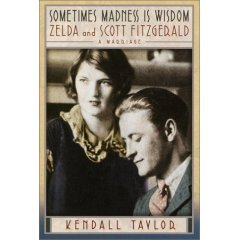
I just finished reading a biography about Zelda and Scott Fitzgerald, Sometimes Madness is Wisdom, by Kendall Taylor. The author of this biography, Kendall Taylor, was once a professor and historian, and he produced a very thorough account of the Fitzgerald's youth, their marriage, and how they fell from the great heights of the Jazz Age into the depths of mental illness and addiction.
Learning more about Zelda made me feel like I had a window into the world of my grandmother when she was in high school. She always got a twinkle in her eye when she talked about how she was a "flapper," and from the way she lived (back in the day), I think Zelda was probably one of her heroes. Sad and flawed, but a hero to a young and impressionable girl nonetheless. Not unlike the jet-setting celebrities of today (think Paris Hilton), Zelda was renowned for her outrageous behavior and her never ending quest for a good time.
I discovered many things about Zelda and Scott's life that surprised me, starting with their promiscuity during a period in time when being chaste was still considered the norm. If Kendall Taylor's findings are accurate, then Zelda actually had sex with one of Scott's college buddies while on her honeymoon. Scott and Zelda were just a vague idea to me before reading Taylor's book, so I never knew how darkly their story ended. Zelda's nude frolicking in New York fountains became the stuff of legend, but her fated attempt to become a professional ballerina in Paris and the way her obsession with dance drove to despair is not mentioned in most accounts of her life. Zelda was an accomplished artist, a skill that she developed during her many stays in mental hospitals around Europe and in America, and several beautiful examples of her work in water color are shown in the book.
I never realized that Scott relied heavily on Zelda's diaries to write his books, and in many instances used whole passages verbatim to build his characters. In the beginning she was flattered that he would build whole novels around characters that he based on her, but when she decided to write a novel herself, Scott jealously undermined her throughout her process of writing her own book. Ultimately, he caused her failure as an author at a time when she desperately needed to succeed at something.
Scott and Zelda drank themselves into oblivion each night as they partied their way through whatever city they found themselves in, and obviously, that lifestyle has its drawbacks. In the end, Zelda became a schizophrenic and Scott became a drunken wastrel. Their daughter, Scottie, is a classic example of a child raised in an alcoholic home, and she admitted in her own biography that not receiving proper parenting herself, she had trouble connecting to and parenting her own children. Scottie tried to avoid the pitfalls of her parents, but in the end, Scott and Zelda's life impacted their daughter and her children in ways that they never could have imagined.
Scott's attempt at becoming a screenwriter in Hollywood failed miserably because of his drinking, and Zelda never did recover her mental faculties. After many years of paying for treatment for Zelda's mental illness, Scott was left financially and creatively bankrupt. They were completely dependent on each other for their identity and for their emotional and financial support, making their relationship both symbiotic and parasitic. Scott died much too young from the effects of alcoholism and Zelda died in fire in a sanitarium. The Fitzgerald's made each other legends, and in the end they destroyed each other completely.
No comments:
Post a Comment